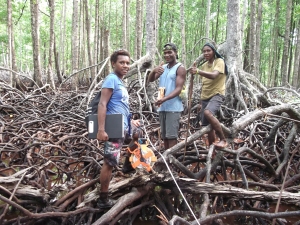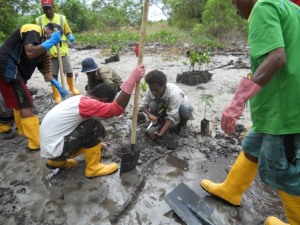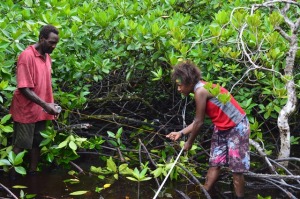Marine Conservation is a unique scientific field that young women who want a real challenging but exciting experience should take up, says Mazzella Maniwavie, winner of the Westpac Women IBBM Young Achiever’s Award.
COURAGEOUS would be the word, I would use to describe this young woman who not only celebrates the Westpac Women’s Award but also the publication of PNG’s first community-based Mangrove Planting Handbook which was launched in June this year.
“It was a long journey and I still have a lot to learn in order to be reputed as an expert in this field”, she humbly said.
At 27 years of age, Mazzella Maniwavie is Papua New Guinea’s first female specialist in the field of mangrove restoration and conservation. Her achievements are a testament of the untapped potential of young people, especially young women and their contribution to nation building.
“Although we have a lot of young Papua New Guineans graduating as biologists and environmentalists, very few specialize in specific marine fields such as mangroves and research on other marine animals that are critical to the health of our coastal ecosystems and important to the bulk of our coastal people, who highly depend on marine resources to sustain their livelihoods”, Miss Maniwavie said.
“It is very exciting because there is still so much that we have yet to learn. I would encourage young vibrant Papua New Guinean women to be adventurous and grasp the many opportunities available for women in our society today, and to excel to another level and to never settle for less. The sky is the limit and if you never try, you will never know the great things you can achieve, “she said.
Mazzella’s love for the environment and oceans goes back to her childhood years growing up with her two siblings at Motupore Island Research Centre in Bootless Bay, Central Province, where her father was stationed as a Marine Biologist.
“My love for nature particularly the ocean was developed during my childhood. I learnt at a very early age how we as humans, depend heavily on our environment and its inherent values to sustain our lives. I was determined from then to protect the environment so nature can continue to look after us”.
“My father was a role model marine biologist who had the greatest influence on my decision to follow in his footsteps at a very young age. He was one of few marine biologists in PNG. I grew up seeing all the work he did in protecting the environment, particularly in the area of mangrove and coral reef conservation which inspired me to take up this field. Mangrove restoration and rehabilitation is in its early developmental stage and I saw this as an opportunity to specialize in this field as no female had ventured into this area. I thought to myself- I should do it!”
“I started firstly as a volunteer with Motupore Island Research Centre’s Mangrove Rehabilitation Project which originated in the East Hiri communities and then expanded on to other provinces through various trained individuals and environmental groups”.
“I spent the next 6 years specializing in Mangrove restoration and recently developed tools and techniques that will increase the survival of replanted mangrove trees. When I graduated from university I was challenged to put this knowledge into practice by running community trainings on mangrove restoration firstly in Central, Port Moresby, Gulf and now full time in New Ireland Province with the Wildlife Conservation Society. My greatest challenge during such mangrove restoration trainings was translating scientific information into simple pidgin that can be understood and actioned at the community level”.
Mazzella’s journey in this technical field has been challenging. She reflects on her time at the University of Papua New Guinea enrolled in the Bachelor of Science (BSc) in Biology program followed later in the Bachelor of Science Honours (BScH) in Marine Biology specializing in Mangrove Conservation.
“I think one of my biggest challenge was time management, trying to balance study and my social life. Scientific research requires a lot of critical thinking, dedication and patience. Securing funding to carry out my research was another challenge in itself, and learning how to manage and acquit large amounts of money at a young age and at the same time working within a time frame to meet my objectives and achieve my Degree. Another big challenge was the environment in itself where I was doing my research. In difficult environments such as the mangrove habitat, I required a lot of physical strength and perseverance and at times I needed males to assist me in doing my field surveys. It was intimidating at times to realise my physical limits as a woman but being very determined has brought me a long way”.
All these challenges has certainly moulded Mazzella to become strong in all aspects enabling her to tackle daily tasks set before her.
“If I am out in the field, my typical day starts at 6 am where I am either travelling between island communities doing awareness on the importance of mangrove ecosystems and its protection or training communities to do mangrove replanting as an adaptive measure to coastal erosion and flooding resulting from climate change. On a more intensive day I do mangrove health surveys with island communities, which is very laborious depending on the size of mangrove forests we survey. When I am in the office my typical day starts at 8 am and finishes at 5 pm and involves long periods of data entry, analysis, reading research articles and reporting”.
Sustainable environmental practises including mangrove conservation is critical in light of climate change and its impact on pacific island nations. Loss of mangroves will have a serious economic impact on both fisheries and coastal communities who depend on the coastline for their sustenance.
As a strong advocate for environment conservation, Mazzella says marine pollution is a major environmental issue in PNG particularly in our major cities and towns.
“Plastic pollution in particular is a major hazard to marine plants and animals and the government has to seriously look into developing best practices to manage waste and educate people on the impacts of such pollution on the marine environment”.
She said everyone including young people have a part to play in the conservation and protection of our environment and the small simple actions we take every day can have a great impact in the future.
“The first step is change our attitude in the way we look at the natural environment and take time to learn how we impact it. Helping the environment does not have to be complicated or time consuming. There are many simple but effective steps we can take to make our community, society and environment a better place to live.
We can all:
1. Plant a tree: it’s good for the air, land and good shade for your house. Trees also provide oxygen for us and help to regulate the world’s climate and atmosphere.
2. Avoid littering: to help your environment clean up your local area and ensure that you do not litter. If there is no bin where you are, carry your rubbish until you get to the next one. Waste, especially plastics are hazardous for marine animals. Turtles, sea birds and other animals can mistake plastic for food or become tangled in it and die.
3. Buy reusable water containers: Most plastic water bottles are not recycled and take many years to decompose. Using a reusable container is a better choice for the environment.
4. Get involved in a community project: find out about local community projects at your school or within your province and support them in protecting the environment.
5. Share information: Pass on the knowledge you’ve learnt to your peers and families. If every person you know takes one small step toward protecting the environment, the collective effort can make a big difference that will benefit the whole planet”.
Mazzella received the Westpac Outstanding Women Young Achiever’s Award in November this year and acknowledges those who have helped her in her journey to make a difference.
“I dedicate this award to my late father who had been the greatest inspiration in my life and profession and to my organization the Wildlife Conservation Society for recognising the work that I do and for giving me the opportunity to reach greater heights in my career.
How do you feel as an outstanding young woman achiever in your category?
I am so happy and very humbled by the opportunity that Westpac is providing to increase the profile of young woman and I am so grateful to the sponsors as this award recognition and its benefits will open a lot of doors for me”.
Note:
Mazzella is from East Sepik and East New Britian Province. Her late father Thomas Maniwavie contributed immensely to Marine conservation in PNG.





